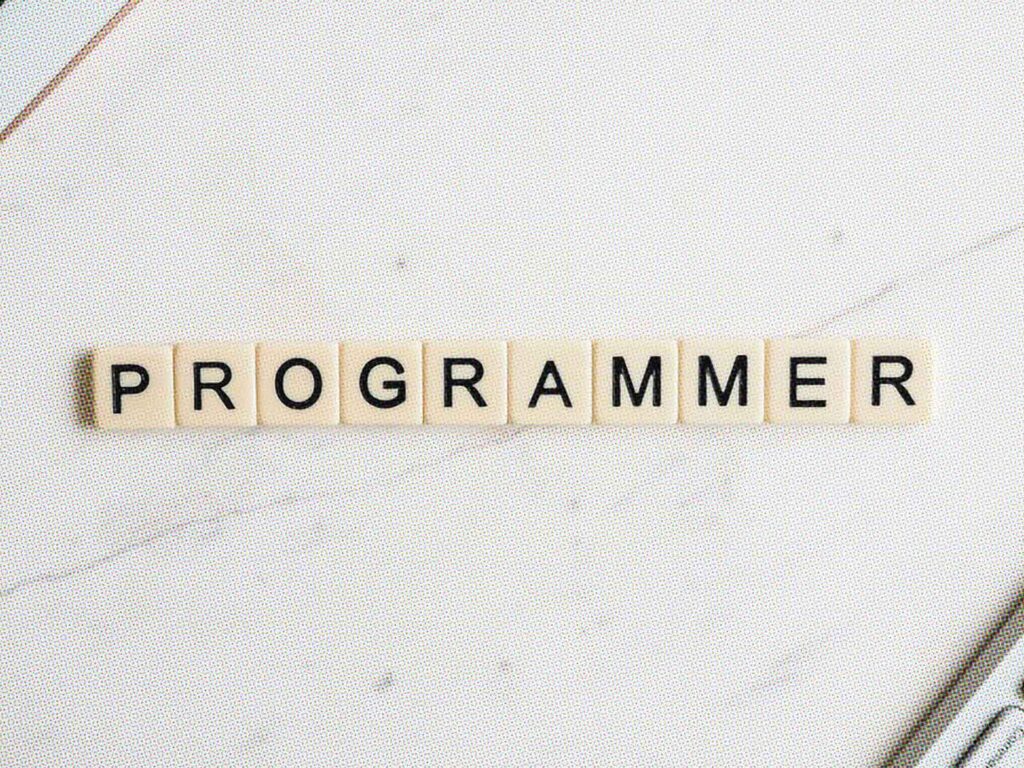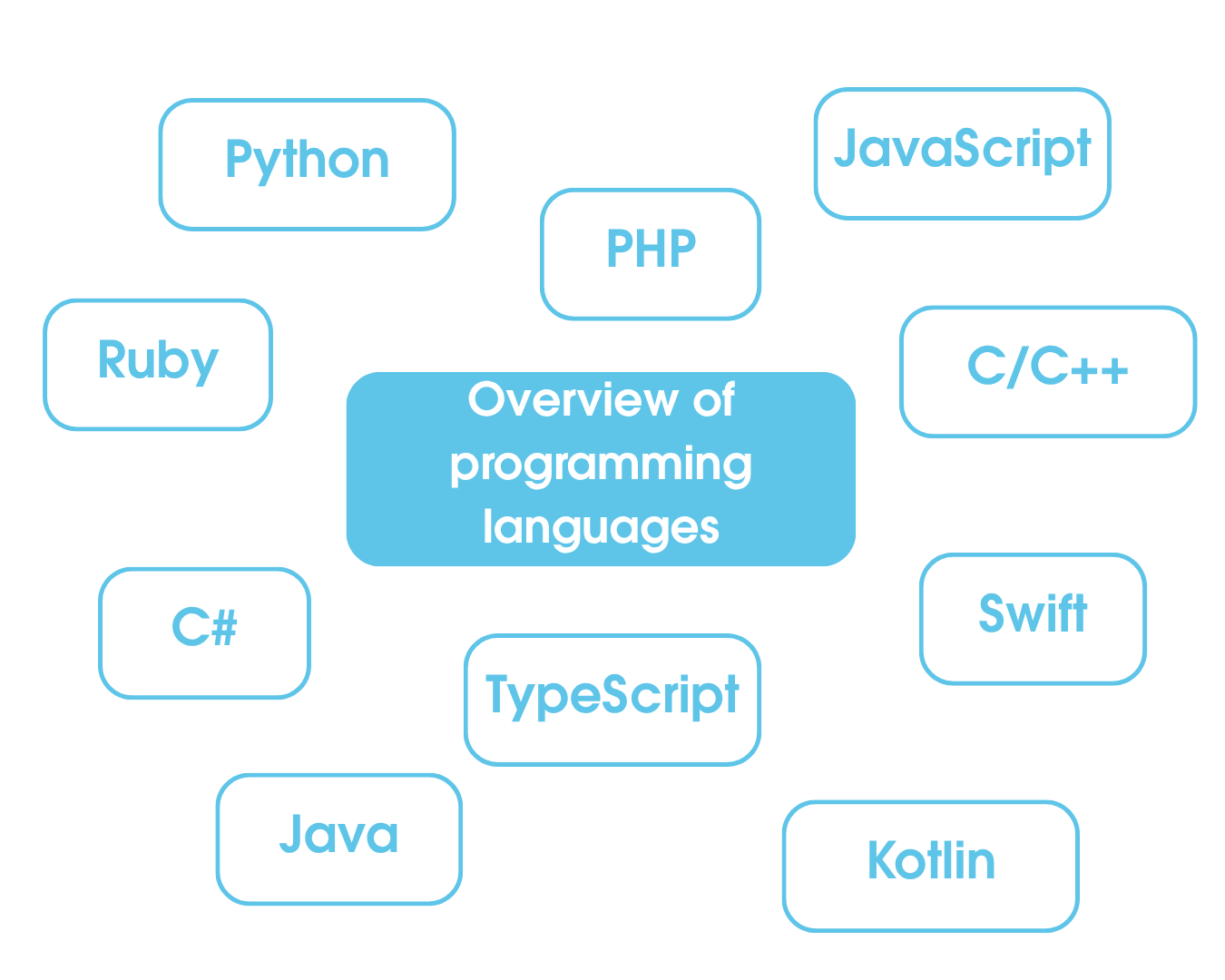
Google Tag Manager is a powerful tool that makes it much easier for website owners to implement and manage tracking codes and marketing tags. In this article you will learn more. ... Continue reading
| 06 min |


| 08 min |
Whether websites, apps, or complex software solutions – nothing works without programming languages. They form the foundation of every digital application and are therefore the tool developers use to bring ideas to life. But what is behind terms such as Python, Java, or JavaScript? And which language is suitable for which area of application?
In this article, you will get a comprehensive overview of the most popular programming languages, their strengths, and typical use cases.
A programming language is a tool that allows you to tell a computer what to do. There are certain rules that determine how these “instructions” must be written. For example, if you want a program to store data, build a website, or calculate something, you need a programming language to do that.
Depending on the language, writing code is either easier or closer to the “language” of the computer – known as machine code. Modern programming languages such as Python or Java make programming particularly clear and understandable. They help you to quickly develop functioning software – from small scripts to large applications.
The wide variety of programming languages results from the different requirements and areas of application in software development. Each language was developed with specific goals and areas of application in mind:
This diversity allows developers to choose the language best suited to their specific requirements, improving the efficiency and quality of software development.
This diversity allows developers to choose the language best suited to their specific requirements, which improves the efficiency and quality of software development.
Here you will find a selection of the best-known and most widely used programming languages, including typical areas of application:

Python is one of the most widely used languages in the world – and for good reason. It is easy to learn and particularly accessible thanks to its clear syntax. At the same time, it is extremely powerful and is used in a wide variety of areas:
This versatility makes Python the first choice for both beginners and professionals.
No modern website works without JavaScript. Originally developed for interactivity in browsers, the language is now a true all-rounder in web development.
Typical areas of application:
Thanks to its flexibility, JavaScript is the basic technology for web developers worldwide.
Java is particularly frequently used in complex enterprise applications. The language impresses with its platform independence (thanks to the JVM), stability, and strong security mechanisms.
Common areas of application:
Many large companies rely on Java because this language allows them to plan for the long term.
Kotlin is a modern programming language that was introduced as an official alternative to Java for Android development. It offers a clearer syntax, reduces error susceptibility, and increases productivity.
Typical areas of application:
Kotlin has become the first choice for many developers, especially for mobile projects.
Swift was developed by Apple specifically for development in the Apple ecosystem. The language is fast, secure, and easy to read – ideal for anyone who wants to develop apps for iPhones, iPads, or Macs.
Possible applications:
Thanks to modern features and good performance, Swift has become an integral part of the Apple world.
C# is the main language of Microsoft’s .NET platform and is therefore perfectly suited for all applications in the Windows ecosystem. It combines modern language features with a clear structure.
Strengths of C#:
C# is one of the top languages, especially in the field of gaming and business applications.
Even though PHP is no longer quite as “hip” as other languages, it is still extremely widespread in practice – especially for classic websites and content management systems.
Typical uses:
Thanks to broad support in web hosting, PHP remains a solid choice for many projects.
The languages C and C++ are the basis of many technologies that are used every day – from operating systems to high-end games. They work closely with the hardware and allow maximum control over memory and processes.
Areas of application for C/C++:
These languages require more technical understanding, but offer maximum efficiency in return.
TypeScript is a further development of JavaScript that makes large projects in particular easier to maintain. Static typing allows many errors to be avoided while writing the code.
Typical areas of application:
TypeScript provides a better overview of the code and increases productivity in development teams.
Ruby was developed to make developers happy. In conjunction with the Ruby on Rails framework, web applications can be implemented extremely efficiently – especially when time is of the essence.
Ruby is particularly suitable for:
Ruby is less suitable for huge systems, but excels with its clear syntax and high development speed.
The decision on which programming language to start with depends entirely on your goals. There is no “best” language for everything – instead, it depends on what you want to develop and how deeply you want to delve into programming.
Here is an overview to help you choose:
If you are completely new to programming, Python is the best choice. The language is easy to understand, easy to read, and is used in many areas. You can use it to:
There is also a large community and many online courses to help you get started.
If you want to build websites – from simple web pages to complex web applications – there is no way around JavaScript. It is the most important language for everything that happens in the browser.
For the backend (i.e., the part that runs on the server), you can also learn:
If you want to develop mobile apps, you should choose the language depending on the target device:
There are also cross-platform tools such as React Native or Flutter that allow you to develop apps for Android and iOS at the same time.
If you plan to develop your own games, the choice of language depends heavily on the game engine:
If you want to write programs that work very closely with the hardware – for example, for operating systems, drivers, or embedded systems – C or C++ is the right choice. These languages offer:
They are considered more complex, but also offer particularly deep insights into how computers work.
There is no general answer to this question, as the duration depends heavily on how intensively you study and what your goals are. Do you just want to learn the basics to automate small tasks or write simple scripts? Or are you planning to pursue a career in software development?
The duration varies depending on your goals:
The speed at which you learn a programming language is influenced by several factors. Prior knowledge of mathematics or logical thinking, or even other programming languages, often makes it easier to get started. The learning method you choose also plays a role: While boot camps usually enable intensive learning in a short period of time, self-study offers more flexibility but also requires a lot of self-motivation.
The practical aspect is particularly important. Clear goals and a high level of self-motivation are crucial. Those who have a specific project in mind or set themselves a clear professional goal usually stick with it longer and make faster progress.
The more you try things out for yourself, solve problems, and work on real projects, the faster you will become confident in using the language.
Over the decades, many programming languages have emerged – but not all of them have stood the test of time. Some have been replaced by more modern alternatives, while others only played a role in certain niches. Here is a brief overview of languages that are hardly used today or have disappeared from active use altogether:
Although many of these languages are no longer actively used, they have had a significant influence on the development of today’s programming world. Some of their concepts live on in modern languages, while others remain as historically interesting milestones.
Choosing the right programming language is more than just a technical decision; it has a significant impact on how efficiently, sustainably, and successfully a project can be implemented. There is no such thing as the perfect language, only the right one for your individual goals. Whether you’re developing a web application, mobile app, automation, or data analysis, every language has its own advantages that need to be leveraged.
If you are developing yourself, it is worth understanding the basics of several languages so that you can respond flexibly to requirements. If, on the other hand, you are planning to implement or outsource a project, a solid basic understanding will help you to better assess the technical direction. In more complex cases, it makes sense to bring in experienced developers or specialized agencies, especially when it comes to long-term maintainability, scalability, or system security.
In the end, one thing matters above all else: The programming language should not be a hurdle, but a tool that brings you closer to your goals. Structured, solution-oriented, and with an eye to the future.
Kathas heart has been beating for marketing since her training as a marketing communications specialist. As part of the eology marketing team, she takes care of the agency's trade fair and event management. Katha also enjoys sharing her accumulated eology knowledge in magazines, blogs and journals.
You want to learn more about exciting topics?


